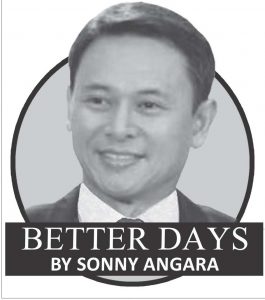
The youth are the torchbearers of the future. They not only hold our dreams in their hands, they also hold the means by which the future of the country will be built. This is why I am honored to be the chairman of the Senate Committee on Youth.
To find out how we are preparing the next generation, I filed Senate Resolution 320, wherein all the laws and programs for the youth would be evaluated. We wanted to find out which are useful and working, which need to be amended, and which have to be repealed or stopped. That way, funding can be concentrated on those which work well.
We need to do this, as our population of nearly 110 million has more than 30 million Filipinos aged between 15 and 30 years old, based on Philippine Statistics Authority (PSA) data.
This week, the Committee on Youth conducted that initial evaluation through a public hearing, where we tackled many issues, some of which we knew already beforehand.
The first issue is one of duplication and coordination. Several government agencies have similar skills-building programs for the youth. Where the Department of Labor and Employment (DOLE) runs its JobStart program and several Government Internships, the Technical Education and Skills Development Authority (TESDA) manages apprenticeships and the dual training system. Meanwhile, local government units (LGUs) take the lead in the Special Employment for Students (SPES) program.
Also, the Asian Development Bank (ADB), in a problem analysis for its Facilitating Youth School-to-work Transition Program, noted that linkages between government agencies, schools and private sector players were weak.
It also became clear during our hearing that there was a need to inform and involve the youth in programs which can help them fulfill their potential. For instance, in the past few years, the Department of Trade and Industry (DTI) has been setting up in our state universities and colleges (SUCs) Fabrication Labs or Fab Labs that are equipped with 3D printers and other technologies for students to tinker with and exercise their creativity. When asked, none of the students that were present at the hearing knew about these Fab Labs.
Labor issues are also affecting the youth, particularly in our apprenticeship system and the type of jobs are available. There are existing government programs to improve the youth’s job skills, particularly those who are employed or seeking meaningful employment, but as the DTI noted, the economy affects the quality of employment.
Programs like the Department of Agriculture’s agricultural training for the children in families whose main sources of income will be displaced, like jeepney drivers, are a good start, but it has also been pointed out that there is a need to adapt programs to the actual skills needed by today’s youth.
The concern, really, is that the combined issues affecting educational programs and labor are creating a circle of inefficiency, with the end-product sadly being youth unemployment — or worse disenfranchisement.
Existing information about the various youth education programs – from how many beneficiaries are in each province, to keeping track of what happens to people who have received assistance from these programs – need to be compiled and analyzed. we can drill down to how effective a specific youth program is not just on a provincial level, but even down to the local community. We also have to make sure that departmental programs are properly promoted, their existence made known to other government units who can use these youth programs to further their departmental missions. Finally, we also have to review various laws which may need amendments, such as RA 7610, as amended by RA 7658, the Special Protection of Children Against Abuse, Exploitation and Discrimination Act, whose IRR does not provide as clear a definition of child labor as may be needed in these times.
We do have a roadmap for the future: The National Economic and Development Authority has Ambisyon. Ambisyon 2040. It is a long-term vision and set of aspirations of the Filipino people for themselves and the country for the next 25 years. Our youth programs, I think, are very important to our plans for where the Philippines should be in 2040. Our youth will be the builders and incoming leaders, when that time comes. We just have to make sure that we will give them as many chances as possible with government programs that will help them and their goals.
***
Sen. Sonny Angara has been in public service for 15 years — nine years as Representative of the Lone District of Aurora, and six as Senator. He has authored and sponsored more than 200 laws. He recently won another term in the Senate. (Email: sensonnyangara@yahoo.com| Facebook, Twitter & Instagram: @sonnyangara)/WDJ

